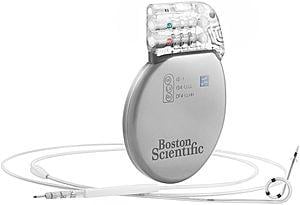December 31, 2013 — Boston Scientific Corp. has received CE mark approval of its X4 line of quadripolar
cardiac resynchronization therapy defibrillator (CRT-D) systems, including the AutoGen X4, DynaGen X4 and InoGen X4 CRT-Ds, a suite of Acuity X4 quadripolar LV
leads and the Acuity Pro lead delivery system. The company's latest devices to treat
heart failure and sudden cardiac arrest are designed to advance patient care and improve the implant experience.
Antonio Curnis, professor, head of
electrophysiology, Brescia University, Civili Hospital, Brescia, Italy, and Dr. Luca Bontempi, an electrophysiologist in the same unit, performed one of the first implants of the AutoGen X4 CRT-Ds.
"The unique design of the Acuity X4 lead allows me to pace from more optimal locations while enabling excellent stability of the lead, low battery consumption and avoiding phrenic nerve stimulation, which are all important issues for CRT patients," said Curnis. "Thanks to the 17 pacing vector options, it is possible to manage microdislodgments of the lead and optimize pacing threshold without additional procedures, drastically reducing the risk to patients. This, along with Boston Scientific's outstanding battery technology, delivers a CRT-D system that truly benefits patients over the long term."
The Acuity X4 suite of quadripolar LV leads are designed with multiple electrode spacing configurations to accommodate individual patient anatomy, including 3-D spiral designs to maximize electrode contact with the myocardium and minimize pacing capture thresholds in non-apical locations. These leads also feature multiple fixation options to optimize stability and the industry's smallest lead tip to enable physicians to access vessels unavailable to other quadripolar leads.
The X4 line of quadripolar CRT-Ds offers the largest number of pacing vector options in the industry and helps physicians effectively address high-pacing capture thresholds and phrenic nerve stimulation, a common complication of CRT therapy due to close proximity of the phrenic nerve to the desired pacing location in the left ventricle. The X4 CRT-Ds also feature Boston Scientific's longevity and six-year warranty. An independent, single-center, observational study of 646 CRT-D recipients (n = 173 BSX, 416 MDT, 57 SJM devices) implanted between Jan. 1, 2008 and Dec. 31, 2010 recently published in the United States showed that during 2.7 +/- 1.5 years follow-up, only 4 percent of Boston Scientific device batteries had depleted, compared to 7 percent from St. Jude Medical and 25 percent from Medtronic [i]. X4 CRT-Ds utilize the same battery capacity and chemistry as the Boston Scientific devices used in this study.
Following CE mark approval of the X4 quadripolar CRT-D systems, Boston Scientific plans to initiate a global clinical trial to gather additional data on Acuity X4 leads in patients indicated for a CRT-D. This prospective, non-randomized observational study, Maximizing CRT Delivery by using multipolar coronary sinus lead family Acuity X4 (Rally X4), is expected to enroll up to 1,000 patients who will receive the Acuity X4 leads at approximately 100 centers across 18 countries.
Boston Scientific's X4 quadripolar CRT-D system is currently approved for use in CE mark countries only. In the United States, the X4 quadripolar CRT-D system is an investigational device and not available for sale.
For more information: www.bostonscientific.com
References
[i] Mian Bilal Alam, Muhammad Bilal Munir, Rohit Rattan, Susan Flanigan, Evan Adelstein, Sandeep Jain, and Samir Saba, Battery longevity in cardiac resynchronization therapy implantable cardioverter defibrillators, Europace 2013 : eut301v1-eut301.


